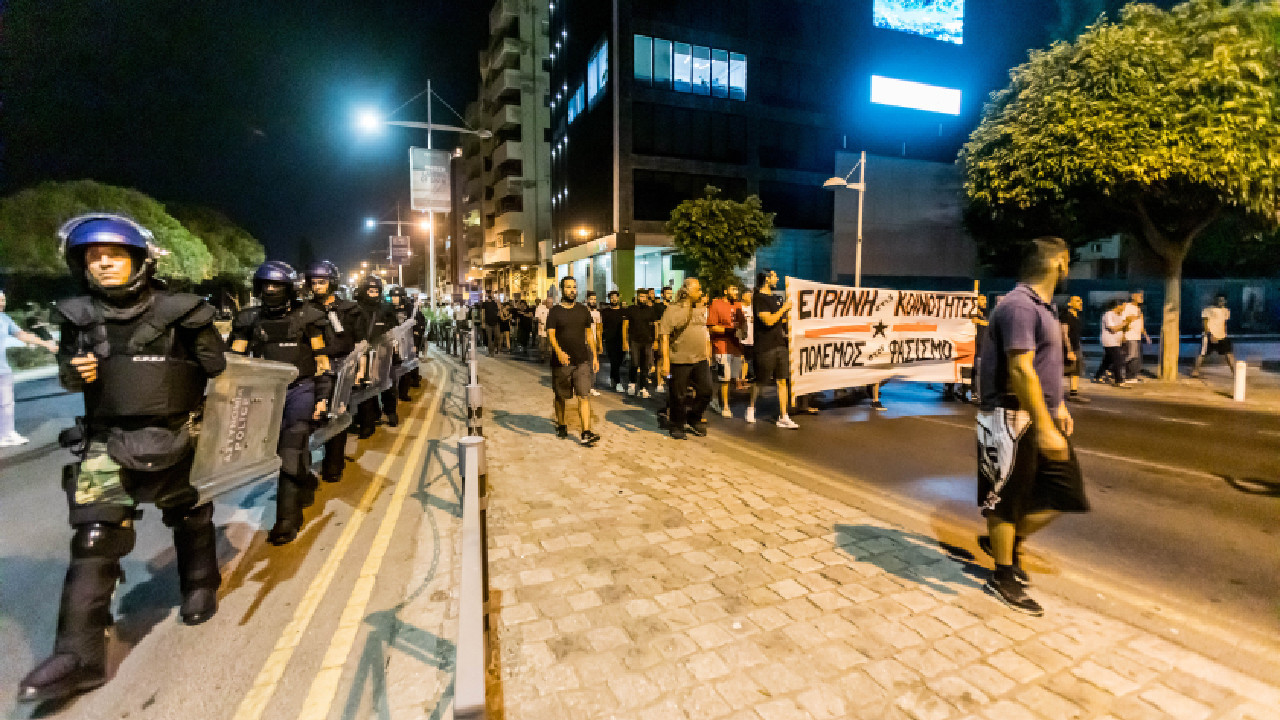NICOSIA – Recent racist attacks on refugees in southern Cyprus have spotlighted xenophobia and racism. Under Nicos Christodoulides, the government has acknowledged its inadequacy in addressing violent far-right incidents, particularly in Limassol. This ‘insufficient’ response to the attacks has come under scrutiny, as refugees and experts attest that the burgeoning fascism observed across Europe is now manifesting in daily Cypriot life.
A refugee residing in Nicosia, requesting anonymity for safety reasons, related his ordeal to deportation threats and racist assaults. “While authorities might deport us any moment, racists might attack us the next,” he explained, revealing his journey to EU-member Cyprus from Africa.
Having traversed to southern Cyprus via the north, he mentioned confronting Turkish officials in the north who allegedly exploited the refugee situation. In the South, he felt he was in a place with dubious respect for fundamental human rights, particularly alarmed by the recent racist offenses. “Sharing even basic information becomes a risk. I can’t even disclose my name without fearing for my life,” he revealed.
Neo-Fascism on the Rise
Kyriakos Tziambazis, a state and legal philosophy specialist, pointed out the resurgence of ‘neo-fascism’ and noted the support nationalist parties extend to anti-Turkish Cypriot stances. “The Greek Cypriot community is revisiting an era of extreme nationalism and neo-fascism rooted in historical narratives. This was particularly evident post-2003, following the removal of barricades and subsequent assaults on Turkish Cypriots. Educational systems, the church, and nationalist parties bolster this anti-Turkish sentiment.”
Highlighting that while neo-fascist movements thrived under ex-president Nicos Anastasiades, he added that the police frequently downplayed racist provocations as mere ‘isolated incidents.’ “Legal actions following attacks on Turkish Cypriots often end in futility. During this time, the extremist group ELAM rose to prominence, initially seeking alignment with Greece’s Golden Dawn but eventually forging its identity. Even in the face of blatant radical activities, the group encountered minimal legal backlash, exposing the entrenched neo-fascist tendencies in Cyprus.”
Recent disturbances in Chloraka and Limassol have alarmed the Greek Cypriot community. These incidents weren’t unexpected, especially given ELAM’s ascendancy in the Greek Cypriot parliament, which indirectly normalized these beliefs. In these events, neo-fascists targeted immigrants, and despite police presence, almost no interventions were made. The primary concern is the chronic erosion of democracy and justice in Greek Cypriot society. The 1964 ‘Law of Necessity’ propagates authoritarianism, racism, and xenophobia. Despite leading the nation, Christodoulides perpetuates policies reinforcing these views. Addressing neo-fascism requires proactive measures against radical nationalism, especially its influence on the youth.
Promotion of Nationalist Myths
Human rights advocate Dr. Christina Valanidou, recognized for promoting inter-community dialogue in Cyprus, denounced the recent violent episodes in Limassol and Chloraka where fascists targeted migrants, Cypriots, and tourists. “Ideologies rooted in fascism and racism have no place in Cyprus, especially considering the nation’s history marred by refugee crises and migrations due to the 1974 political upheavals,” Valanidou remarked, critiquing both the educational system and the media for their insufficient promotion of universal human rights and values.
She indicated that although southern Cyprus’s official curriculum professes to champion democracy and counteract racism, routine practices, including historical teachings and specific festivals, inadvertently advance nationalist myths. Likewise, mainstream media often perpetuates xenophobic narratives, frequently pinning national challenges on impoverished foreign residents.
Drawing from sociologist Anna Fragkoudaki’s insights, Valanidou stressed the ubiquitous nature of racism in public discussions, even among those claiming to oppose discrimination. Valanidou emphasized the urgency of a societal reckoning and a collective stand against racism and fascism. She urged authorities to revisit their educational strategies, eradicate hate speech, and instate strict legal measures. “Implementing these actions can restore hope for a more inclusive.
Responsibility must be taken for inaction and silence
Marina Economidou, Editor-in-Chief of the Cyprus edition of Kathimerini, highlighted the dangerous implications of fascism. “While the debate on fascism continues, many fail to grasp its grave repercussions, with some opting to dismiss it entirely,” Economidou remarked. She stressed that personal accountability is paramount in the wake of the surging far right: “It’s imperative to take responsibility for inaction, silence, or overlooking fascism. Merely sidestepping or downplaying the issue won’t suffice; precise language is essential.”
Economidou underscored the significance of adhering to international conventions concerning refugee rights. Referring to the extremist remarks by figures like EDEK leader Marinos Sizopoulos, notorious for his anti-refugee sentiments, as ‘disturbing,’ the journalist observed: “Such views are intensified by the state’s depiction of every foreigner as a looming threat or potential criminal. Sizopoulos’ contentious stances are echoed by numerous Greek Cypriot politicians in Cyprus today.” Economidou cautioned that society is currently confronting the severe fallout of past actions and attitudes, emphasizing the growing normalization of not just racism but also violence within Cyprus.
The collective forgetfulness
Apostolos Kouroupakis, a journalist in Cyprus, asked: “Is Cyprus, bearing its traumatic and agonizing history, undergoing a bout of collective forgetfulness?”
Drawing inspiration from Thore D. Hansen’s “We Didn’t Want to Know” and “Goebbels’ Secretary Reveals, “Kouroupakis posited that society exhibits a “deliberate blindness that bolsters the far right.” He remarked, “Hansen’s portrayal of Brunhilde Pomsel, the secretary to Hitler’s Propaganda Minister Joseph Goebbels, underscores that the shadow of fascism remains undefeated.”
Kouroupakis further alluded to the ‘inhumane’ circumstances prevalent today, referencing Ferdinand Bruckner’s play “The Youth Sickness”. He commented on how daily adversities might nurture the most malevolent facets of humanity. Drawing a parallel between the prevailing conditions in Chloraka and a ‘pressure cooker,’ Kouroupakis suggested, “If the mounting tension isn’t alleviated, it will inevitably culminate in a violent outburst.” He added that the enduring refugee predicament in Cyprus has grown increasingly intricate. Kouroupakis asserted that the entire community holds responsibility for this crisis and urged the populace to rigorously scrutinize and contest the narratives advanced by politicians and the ‘elite’.
Nikolaos Stelya
Source:Duvar English



